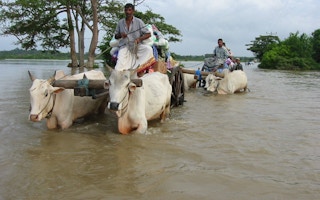Depression is influenced more by environmental factors than genetic ones, said a study conducted in Sri Lanka — a country devastated by a long-running civil war (1983–2009) and the 2004 Indian Ocean Tsunami, resulting in hundreds of thousands of deaths and massive economic losses.
More than half of the differences in depression symptoms among 3,948 individuals studied could be explained by environmental influences rather than genetic ones, said Helena Zavos, an author of the study and lecturer at the department of psychology, King’s College London, UK.
“These environmental influences were not shared amongst family members — for example, stressful life events,” Zavos said.
Published March 30 in PLoS One, the study noted that parts of the Sri Lankan population were disproportionally affected either socioeconomically or emotionally by the civil war and the tsunami. Such pervasive experiences could lead to environmental variability and may explain why the heritability of health-related quality of life (HRQOL) traits were found insignificant, the study said.
“
Individuals who reported more depression symptoms reported a lower level of health-related quality of life. This highlights the importance of considering mental health and well-being in individuals who have chronic physical health conditions
Helena Zavos, senior lecturer, King’s College London
The US Centres for Disease Control and Prevention defines HRQOL as the perceived physical and mental health over time of an individual or a group. An individual’s HRQOL is intimately connected to the number of depressive symptoms that a person reports and measuring it can help calculate the load of preventable diseases and disabilities.
“We found that individuals who reported more depression symptoms reported a lower level of health-related quality of life,” said Zavos. “This highlights the importance of considering mental health and well-being in individuals who have chronic physical health conditions.”
“Shared environment (e.g., tradition, extended family members, the elders) may be a protective factor against depression in Sri Lanka,” said Ramdas Ransing, faculty of psychiatry at BKL Walawalkar Rural Medical College in Maharashtra, India.
Ransing also suggested that such shared environment “may be a protective factor against depression [among women] in Sri Lanka”.
Depression is linked to adverse environmental factors such as the onset of illness or the death of the significant other, said Soumitra Shankar Datta, senior consultant psychiatrist at the Tata Medical Centre, Kolkata.
“The study shows that depression is associated with the quality of life in several domains such as general health, fatigue, social functioning, and others,” Datta explained.
More than 75 per cent of people in low- and middle-income countries do not receive any treatment for mental disorders although these disorders — which include depression — have recognised and beneficial treatments, said the World Health Organization (WHO). Depression affects nearly 280 million people across the world and may, in the worst cases, lead to suicide.
Depressive symptoms listed by the WHO include poor concentration, feelings of guilt, low self-worth, hopelessness about the future, thoughts about dying, disrupted sleep, loss of pleasure or interest in activities lasting for at least two weeks.
The study findings suggest modest associations between depressive symptoms’ severity and lower physical and psychological functioning, mainly due to overlapping gene-related and environment-related impacts.
“Poverty, lack of opportunities, social adversities are common in people with depression and are very important for most low- and middle-income countries including Sri Lanka where the study was conducted,” said Datta. “The findings will support clinicians to individualise the treatment approach to each person’s reality.”
The authors said that because mental health problems carry social stigma in Sri Lanka they cannot exclude the possibility of response bias to the questionnaires given to the subjects.
This article was originally published on SciDev.Net. Read the original article.










